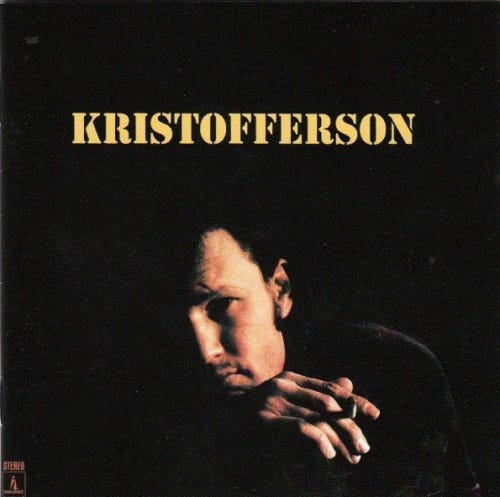Kris Kristofferson — Kristofferson
23.May.2020
Kris Kristofferson
Kristofferson
1970
It seems only fitting that this Memorial Day to tip the hat to someone who served in the Armed Services. While there are more than you may think (Ice-T, Willie Nelson, Maynard James Keenan, et al), I chose Kris Kristofferson.
After graduating summa cum laude with his BA in Literature from Pomona College, he received a Rhodes Scholarship to Oxford University, where he boxed, played rugby, began writing songs, singing and performing … and he studied English literature at some point too.
After graduating from Oxford, Kristofferson joined the U.S. Army, was commissioned as a second lieutenant. He then became a helicopter pilot and completed Ranger School.
Rumor has it he was also considering studying Cardiac and Thoracic Surgery.
As his time in the Army came to a close, he had achieved the rank of captain and given the plum assignment to teach English at West Point. Instead, Kristofferson decided to leave the Army and pursue a career as a songwriter — very much to the chagrin of his family — they disowned him.
Make no mistake, Kris Kristofferson served his country dutifully, both in uniform and in art.
Kristofferson opens with “Blame It On The Stones” which captures a Dylan-esque ironic jab at the middle-class establishment. The Rolling Stones were as much to blame for American strife in 1970 as socks. But back then, just as today, blame that which don’t know or choose to know. It’s easier.
“To Beat The Devil” is to live your life on your terms … well, it’s how I read it. And there are few songs that sum up the innate nature of the artist. It’s a long way to the top for any artist, regardless of medium, but what happens if you don’t make it? I suspect it’s a lot like this:
I was born a lonely singer
And I’m bound to die the same
But I’ve gotta feed the hunger in my soul
And if I never have a nickel
I won’t ever die ashamed
’Cause I don’t believe that no one wants to know
Kris Kristofferson is a dynamic and gifted songwriter, but the same can’t be said of his singing. So the kind of vocal rawness on Kristofferson either draws you in, or alienates you, there is no middle ground.
At the end of the day, it’s the songs on Kristofferson. It’s always about the songs with Kris Kristofferson … because he’s a songwriter.
Kris Kristofferson was part of a new group of songwriters who sought to bring realism to country music. He was part of a growing Nashville creative “outlaw” movement that ignored the Nashville music machine in favor of independent songwriting and producing.
With that said, realism and social commentary in music weren’t a thing in Nashville in 1970. At least not overt commentary. And while Kristofferson didn’t necessarily kick the door down, the album moved the needle in that direction with songs like “Best Of All Possible Worlds”:
When I tipped my bottle back and smacked into a cop I didn’t see
That policeman said, “Mister Cool, if you ain’t drunk, then you’re a
fool.”
I said, “If that’s against the law, then tell me why I never saw
A man locked in that jail of yours who wasn’t either black or poor as
me?”
Funny how 50 years on, that’s still a far too accurate lyric.
Of course, there’s “Me and Bobby McGee” which was a monster hit on Janis Joplin’s posthumous Pearl. There’s also “Help Me Make It Through The Night” which would become a hit for #1 Country Hit for Sammi Smith in 1970, as well as covered by who’s who in modern American country and pop music (and one in French.)
A fan favorite is “Sunday Mornin’ Coming Down” because, well … most of us at one time or another have had a horrible hangover.
In the coming years artists like Johnny Cash, Waylon Jennings, Jerry Lee Lewis, Willie Nelson, and Gordon Lightfoot would cover Kris Kristofferson’s songs and have varying degrees of success.
History has been kind to Kristofferson because it captures a moment. It’s an album that will continue to find new audiences. A retro-review by Rolling Stone, Adam Bresnick praised the melancholic passion of Kristofferson’s singing and regarded the album as “one of the great lost records of the hippie era, a country masterpiece packed with tales of drifters and dreamers recounted in rough-hewn poetry worthy of the best honky-tonk songwriters.”
In 1970, critic Robert Christgau of the Village Voice was less enthusiastic, finding Kristofferson “deft and common” as a songwriter but “the worst singer” he had ever heard. “He has no relation to key … no phrasing, no dynamics, no energy, no authority, no dramatic ability, and no control of the top two-thirds of his six-note range.”
Maybe that’s the review that made Nashville consider Kristofferson a “failure.” But it still made its way to #10 on the Billboard Country Album Chart and #43 on the Pop Chart.
Before Kris Kristofferson had proven himself to be an important American artist, he had proven himself to be an important American by faithfully serving in the Army.
Having been firmly embedded in the establishment, it made him one of the driving forces that would become the Nashville outlaw music scene that included Waylon Jennings, Merle Haggard, Johnny Cash, et al.
The outlaw rebellion in Nashville may not have begun with Kris Kristofferson, but with Kristofferson, the outlaw movement had found a dutiful captain … who would eventually become a four-star general.




